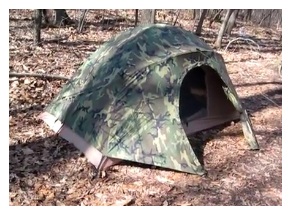Camping and Survival Gear
Having the right camping and survival gear can and will make all the difference in the case of an apocalyptic event. You may find yourself out of the house when the event happens, or you may feel that it's not safe to stay within your own home due to radiation or subsidence. In either case, you should not underestimate how much harder it is to survive outside a permanent shelter, and your choice of camping equipment needs to reflect this.

The Essentials
Every human has basic needs that need to be met for survival and the weather and openness of the outside world makes it much harder to meet them.
Your camping & survival gear should target these basic needs first before you start to address your long term plans:
- Warmth - Without warmth, humans very quickly lose their internal body heat, which in turns makes all of your internal organs work slower and less efficiently. Once you and your family are safe, your first thoughts need to be about fire, and you have numerous options available to you. Packing matches or a lighter will only provide you with so many fires unless you can keep one alive for days on end. A better option is a simple flint to create sparks. You will need to practice using tinder to turn the spark into a fire, but this way the heat will not run out. If you have space, you should also pack thick blankets for additional warmth.468
- Shelter - Unless you are lucky enough to live near some woods, you stand at the mercy of wind, rain and sunshine without a form of shelter. These can affect your health and level of warmth, as well as lowering moral. Your camping and survival gear pack should include some form of shelter, whether it's a full on tent that you can unpack and set up in minutes or plastic sheeting that you can pin up with branches or attach to trees. If you choose a tent, make sure it will be big enough for all the people staying with you and that you buy one that you can use any time during the year.
- Nutrition - The human body can survive for a day or two without water and up to three weeks without food, but you should have means of getting both in your camping and survival gear. For water, you will need containers as well as a means of purifying it, in case you cannot find a clean source. For food, you'll need to think about how much space you have, as you can either take canned or freeze-dried food for the first few days, or take items like knives and snares to catch and prepare food that you find in the wilderness.
Additional Extra
Once you've worked out how to feed yourselves and keep yourselves warm and dry, you can begin to think about a long term plan for survival. You should think about including some of the following in your survival gear:
- Medical kit - If you have to survive in the wild, the chances are that hospitals will not be functioning. At a minimum, your medical kit should include Band-aids, disinfectant, medical tape and painkillers.
- Cord - You can also use rope, but cord tends to be thinner and stronger. You will find numerous uses for the cord, from tying up sheets against the wind to fixing traps for wild animals.
- Compass - If you need to leave your base camp, you will need to be able to find your way back and you will not be able to rely on the weather remaining constant. Your compass will be your guide in the first few days while you find your bearings.
The content of your camping and survival gear will depend on your storage space. It may be worth having a larger supply stored somewhere in your house and a smaller bag in the trunk of your car so "it's" ready wherever you are.
Leave Camping and Survival Gear and Return to Survival Equipment





New! Comments
Have your say about what you just read! Leave me a comment in the box below.